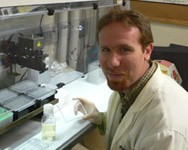A UA professor and his students are diving into a world of ocean viruses to learn how they affect microbes, the producers of half of the world’s oxygen.
Matthew Sullivan, an assistant professor in the department of ecology and evolutionary biology, works with students from his lab to study how ocean viruses can directly impact the way microbes function. They’ve been on a number of research programs dozens of times.
Ocean viruses that encode the core gene of photosynthesis work as a crutch by infecting photosynthetic cells, helping the photosynthetic process happen. This process allows plants to take sunlight and convert it into chemical energy, producing oxygen. His research could be applied in practiced science, he said — scientists are looking into replacing viruses with antibiotics to kill certain bacteria.
“I guess it’s like a couple-week summer camp, except with a lot more money riding on it and a lot more intensity,” Sullivan said. “You’re sometimes where you can’t see land for days … you’re in there, you’re in nature.”
One of the many programs Sullivan’s lab has worked with is Tara Oceans, an expedition program where participants aim to learn more about how climate change impacts the Earth’s ecosystems. Members of the Tara Oceans expeditions traveled the world for two years with scientists from many different areas of expertise. Sullivan served as their “virus guy,” he said.
“It’s a real community. Look at all the things that you could possibly want to measure … and doing that around the world in a way that’s systematic,” Sullivan said.
On land, Sullivan and his students study ocean viruses in a more structured manner by testing the biological features of these viruses. From undergraduates to post-doctorates, students examine how ocean viruses behave under different conditions and in competition with each other.
“When a field is so unknown, it opens a lot of doors to be creative,” said Cristina Howard, a doctoral student studying molecular and cellular biology. “So you come up with new ideas, new experiments, ways of approaching our questions in very different ways. That is the greatest, I would say, part of science.”
These viruses are abundant in the ocean, and understanding them is important to understanding Earth’s systems because they affect a major part of Earth’s photosynthesis processes, as well as oxygen production, Sullivan said.
“So it’s important because water is usually available, but making hydrogen is important because of energy and making oxygen is important because we need to breathe,” he added. “Really, really tiny things are moving the elements around in ways that help make sure there’s energy available for life.”
Ocean viruses can either kill microbes or perform a horizontal gene transfer, which can harm how genetic materials between organisms interact. Students in Sullivan’s lab are trying to learn more about dying microbes that produce a lot of oxygen and positively impact the environment by eliminating organic pollutants.
“When you are working on a ship the lab is moving all the time … maybe you get sick and there are days you can’t work,” said Elena Lara, a fourth-year graduate intern from Spain who’s been working in Sullivan’s lab for the semester. “But it’s nice to be in the ocean.”









